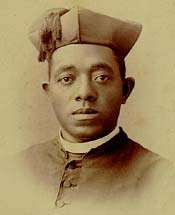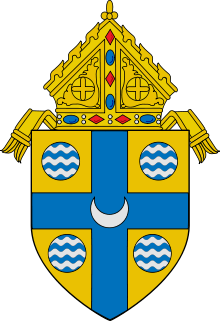Quincy University
Quincy University (QU) is a private Roman Catholic liberal arts university in Quincy, Illinois. It was founded in 1860 by Franciscan friars. The university enrolls about 1,100 students.[3]
 | |
Former names | St. Francis Solanus College and Seminary St. Francis Solanus College Quincy College |
|---|---|
| Motto | "Praeco Sum Magni Regis" (Latin) |
Motto in English | "I am the herald of the Great King" |
| Type | Private |
| Established | 1860 |
Religious affiliation | Roman Catholic |
| Endowment | 12.7 mil[1] |
| President | Brian McGee, Ph.D.[2] |
Administrative staff | 135 |
| Students | 1,098 |
| Undergraduates | 1,021 |
| Location | , , United States (39.940700°N 91.386029°W |
| Campus | Small city |
| Colors | Brown and White |
| Athletics | NCAA Division II - GLVC |
| Nickname | Hawks (nickname), Victor E. Hawk (mascot) |
| Website | quincy |
 | |
History

A small group of Franciscan friars left Germany in 1858 to serve the German-speaking population in what was then the frontier state of Illinois. On February 6, 1860, they founded the institution as St. Francis Solanus College. This school was established at 8th and Maine Street. Under the leadership of Fr. Anselm Mueller, who served as president for a total of 37 years beginning in 1863, the institution moved to its current location on what is now College Avenue.
Following two other name changes during the twentieth century, the current name, Quincy University, was adopted in 1993. The university name was adopted in part to recognize the addition of graduate programs.
From its founding, Quincy University has combined a deep commitment to the liberal arts with a recognition of the importance of professional programs. The earliest course catalogs, from the 1870s, combined a strong focus on the liberal arts with courses in accounting and other “commercial” programs. Quincy University continues to offer majors in the liberal arts and in the professions.
Quincy University typically enrolled under 300 students until the 1930s. The first woman enrolled at the university in the 1920s, and women were regularly admitted beginning in 1932. Quincy University was involved in educating Army reservists and Navy cadets during World War II, and enrollment grew after the Second World War. The university first enrolled over 1,000 students in the late 1950s. In response to this enrollment growth, several new buildings were planned and put up during the 1960s.
The Franciscan friars made up the majority of the university faculty until the late twentieth century. The distinctive Franciscan intellectual tradition remains central to the mission and values of the university. Since the founding of the institution, many Franciscan friars in the Midwest have been educated at Quincy University. Today, the university is home to people of all faiths, who are welcomed in the Franciscan tradition of hospitality.
In 1990, the campus became home to Franciscan Press (formerly Franciscan Herald Press). The press closed in 2007.[4]
Academics
Quincy University is organized into four divisions and two schools:[5]
Divisions
- Behavioral & Social Sciences
- Fine Arts & Communication
- Humanities
- Science and Technology
Schools
- Business
- Education
At the undergraduate level, QU requires completion of the Bonaventure general education program, which includes a significant service requirement for all students. Bachelor of Science and Bachelor of Arts degrees are offered in 46 major areas of concentration. The university also supports a variety of non-degree programs and multiple degree-completion options for non-traditional students. Courses are offered in traditional, online, or hybrid formats.
At the graduate level, QU offers a Master of Business Administration (MBA) degree, a Master of Science in Education (M.S.Ed.) degree and a (M.S. Ed) Master of Science in Education in Counseling degree. The MBA degree is offered entirely online.
Classroom technologies and resources are tailored to the needs of specific academic programs. Updated and renovated laboratories in computer science, cybersecurity, biology, and chemistry are available, as is the John “Pete” Brown Mock Trial courtroom.
Accreditations
Quincy University is accredited by the Higher Learning Commission. QU also has specialized accreditation from the Council for Accreditation of Counseling and Related Educational Programs (CACREP).
Campus
Quincy University's compact, walkable campus is located in a residential area, a few blocks away from Quincy's Broadway Avenue shopping and business district.
Historic Francis Hall is at the center of campus and was built and expanded between 1871-1898. The campus also features many distinctive examples of Mid-Century modern architecture in its residence halls and classroom and administration buildings. Friar's Field, a large lawn that held various athletic fields during the nineteenth and twentieth centuries, now creates a park-like setting for the campus. The newest additions to campus include a large health and fitness center and an apartment-style residence hall.
The historic campus holds several noteworthy traditional and contemporary public art installations. The Brenner Library includes the highly regarded Gray Gallery, which features art exhibitions throughout the year.
The spiritual center of Quincy University is its beautiful chapel, which was built in 1911 and has been renovated on several occasions. The chapel design was shortened and modified to preserve the baseball field then located just to the north of Francis Hall.
A former Franciscan seminary is now part of Quincy University, just a few minutes to the north of the university's historic campus. Now called the North Campus, this extensively renovated facility houses most of the Division of Science and Technology, the Connie Niemann Center for Music, and the QUTV television studio. The university's soccer stadium and softball complex are located adjacent to the North Campus. The football stadium and baseball field are part of the main campus and feature distinctive limestone walls. The football and baseball facilities were built in the 1930s and have been extensively renovated.
Campus life at Quincy University features many student clubs and activities, including three Greek-letter organizations. Greek houses are located on campus.
Each year, the Inaugural ceremony brings together faculty, staff, new students, and parents to celebrate the beginning of the university experience for new students. Following a procession by the faculty in academic regalia, the ceremony takes place in St. Francis Solanus Church, a Franciscan parish located across the street from Quincy University.
Quincy University is located in Quincy, Illinois,[6] an attractive, affordable small city of about 40,000. Located on the Mississippi River, Quincy was the site of a Lincoln-Douglas debate and has played an important role in Illinois and U.S. history. With several manufacturers and health-care providers, Quincy provides many opportunities for employment and internships.
Students and alumni
The student body at Quincy University is about 52% men and 48% women. Most students come from Illinois and Missouri, but several other states in the Midwest and South are well represented at QU. Over 15,000 Quincy University alumni live in all 50 states and 12 foreign countries.

Athletics
Quincy University is a member of NCAA Division II and has been a part of the Great Lakes Valley Conference (GLVC) for most sports since the 1995-96 school year. Men's volleyball competes in the Midwestern Intercollegiate Volleyball Association (NCAA Division I). Several teams have had significant national success, with men's soccer winning 11 NAIA national championships.
|
Men's sports
|
Women's sports
|
Notable alumni

- Rick Hummel, Hall of Fame Baseball writer
- Kane (wrestler) aka Glen Jacobs, Professional Wrestler (although he did transfer to Truman State University)
- Josh Kinney, relief pitcher for the Seattle Mariners
- John Mahoney (Bachelor of Arts), television and theatre actor[7]
- Zoe Nicholson, Equality Activist, Speaker and Writer
- James Pankow, trombonist for the band Chicago (only for his freshman year)
- Michael A. Perry, Minister General of the Order of Friars Minor [8]
- Josh Rabe, former outfielder for the Minnesota Twins [9]
- Lindell Shumake, Republican member of the Missouri House of Representatives
- Francis G. Slay, former mayor of St. Louis, Missouri
- Paul Splittorff (Decsd) Pitcher and 20 Game Winner, Kansas City Royals (freshman year only)
- John M. Sullivan, Illinois State Senator
- Michael Swango, prolific serial killer and physician
- Scott L. Thoele, U.S. Army National Guard general
- Augustine Tolton, first African-American Catholic priest
- Mary Jo White, Pennsylvania State Senator
- Brandon DeJaynes, Minor league pitcher for the St. Louis Cardinals and winner of 4th flight of 2019 Quincy City Golf Championship (96-72-168)
References
- https://datausa.io/profile/university/quincy-university#:~:text=Quincy%20University%20has%20an%20endowment,all%20Masters%20Colleges%20and%20Universities.
- Executive Leadership Team Archived January 23, 2015, at the Wayback Machine. quincy.edu
- Husar, Deborah Gertz (September 6, 2016), "QU freshman class largest in more than two decades", Quincy Herald-Whig, Quincy, IL, retrieved 2016-09-08
- "Franciscan Press closing shop". Herald-Whig. Retrieved 2019-12-22.
- "Quincy University - Quincy University". Quincy.edu. Retrieved 2015-07-18.
- "Visit Quincy, IL". Quincy IL Convention & Visitors Bureau. Retrieved 2019-08-20.
- Biography page, John Mahoney (I) on IMDb. Accessed 2008-10-05.
- http://www.quincy.edu/wp-content/uploads/2016/01/Winter14.pdf
- http://quhawks.com/coaches.aspx?rc=270&path=baseball
